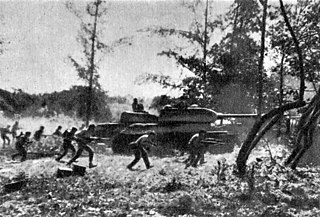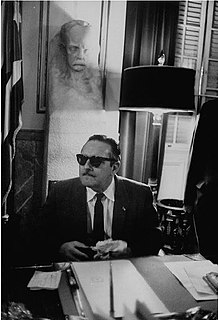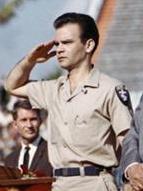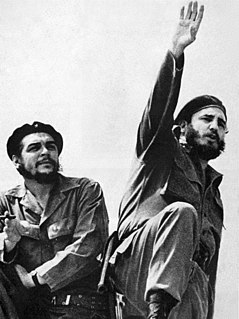
José Ramón Fernández Álvarez (November 4, 1923 – January 6, 2019) [1] was a Cuban Communist leader who was a vice-president of the Council of Ministers.

José Ramón Fernández Álvarez (November 4, 1923 – January 6, 2019) [1] was a Cuban Communist leader who was a vice-president of the Council of Ministers.
Fernández Alvarez was born in Santiago de Cuba, where he studied his first and second education. In 1947 he graduated from the Cadet School of Cuba and also from the Artillery School as well as from other courses of the General Staff in Cuba and at Fort Sill in the USA.
From March 10, 1952, he took part in different conspiracy activities and movements against Fulgencio Batista's tyranny with different military and political groups, until 1956 when he was caught when the conspiracy movement called "Los puros" was discovered. He was judged and sentenced to prison at Presidio Modelo on the Isla de Pinos (Isle of Pines) until the Castro brothers' victory over Batista on January 1, 1959.
From 1959, as a member of the Revolutionary Armed Forces, Fernández took part in various mobilizations, both productive as well as for the defense of the country. He also carried out other tasks of the Cuban Revolution both in Cuba and abroad.
At the time of the Bay of Pigs Invasion on 17 April 1961, he was director of militia training and based at Managua near Havana. He was sometimes referred to as 'El Gallego' like his colleague Manuel Piñeiro. Before dawn that day, Fidel Castro ordered him to command the many battalions of militia and regular army troops engaged in fighting the invading forces of Brigade 2506. Late on 19 April 1961, he was among Cuban government forces who finally broke through to Playa Giron and forced the surrender and dispersal of invading troops. [2]
He was promoted to the rank of Capitan in 1959, to Commandant in 1961 and to Brigade General of the reserve in 1966. He graduated from the Higher War School in 1964. From 1959 on he was in charge of different responsibilities and positions, among which there were; Director of the Cadet School of the Rebel Army; Chief of the Direction of Combat Preparation of the General Staff of FAR (initials for Revolutionary Armed Forces in Spanish) until 1968; Deputy Minister of FAR until 1970; First Deputy Minister of Education until 1972; Minister of Education from 1972 until 1990 and vice-president of the Council of Ministers from 1978 to March 2012.
He represented the Cuban government at the investiture of presidents in several Latin American countries and at other governmental events. He was a member of the executive committee of the Pan American Sports Organization.
Fernández Álvarez took part in the seven Congresses of the Cuban Communist Party and beginning in 1975 was a member of the Central Committee.
At the third congress of the Cuban Communist Party, he was elected as a Substitute Member of the Political Bureau. Fernandez was a deputy to the National Assembly from 1976 until his death and a Member of the Council of State from 1981 until 1993.
Fernández chaired the Organizing Committee of the XIV Central American and Caribbean Games, held in Havana in 1982, and the Organizing Committee of the XI Pan American Games in Havana in 1991. He was also the chairman of the Organizing Committee of the VI Athletics World Cup that took place in Havana in 1992. From 1997 until 2018 he was the President of the Cuban Olympic Committee. [1]
He was the chairman of the Organizing Committee of the Scientific–Academic Conference "Giron, 40 years later", which took place in March 2001 and of the International Conference "The Missile Crisis, a political vision 40 years later" in October 2002. Fernandez was Emeritus Professor of the Pedagogical Higher Institute "Enrique José Varona".
In recognition of his work he was awarded several medals, among them the title of Hero of the Republic of Cuba.

The Bay of Pigs is an inlet of the Gulf of Cazones located on the southern coast of Cuba. By 1910, it was included in Santa Clara Province, and then instead to Las Villas Province by 1961, but in 1976, it was reassigned to Matanzas Province, when the original six provinces of Cuba were re-organized into 14 new Provinces of Cuba.

Fulgencio Batista y Zaldívar was a Cuban military officer and politician who served as the elected president of Cuba from 1940 to 1944 and as its U.S.-backed military dictator from 1952 to 1959, when he was overthrown by the Cuban Revolution.

The Bay of Pigs Invasion was a failed landing operation on the southwestern coast of Cuba in 1961 by Cuban exiles who opposed Fidel Castro's Cuban Revolution, covertly financed and directed by the U.S. government. The operation took place at the height of the Cold War, and its failure influenced relations between Cuba, the United States, and the Soviet Union.

The Cuban Revolution was an armed revolt conducted by Fidel Castro and his fellow revolutionaries of the 26th of July Movement and its allies against the military dictatorship of Cuban President Fulgencio Batista. The revolution began in July 1953, and continued sporadically until the rebels finally ousted Batista on 31 December 1958, replacing his government. 26 July 1953 is celebrated in Cuba as Día de la Revolución. The 26th of July Movement later reformed along Marxist–Leninist lines, becoming the Communist Party of Cuba in October 1965.

Manuel Urrutia Lleó was a liberal Cuban lawyer and politician. He campaigned against the Gerardo Machado government and the second presidency of Fulgencio Batista during the 1950s, before serving as president in the first revolutionary government of 1959. Urrutia resigned his position after only seven months, owing to a series of disputes with revolutionary leader Fidel Castro, and emigrated to the United States shortly afterward.

Manuel Francisco Artime Buesa, M.D. was a Cuban-American who at one time was a member of the rebel army of Fidel Castro but later was the political leader of Brigade 2506 land forces in the abortive Bay of Pigs invasion of Cuba in April 1961.
Corps General Abelardo Colomé Ibarra was a Vice President of the Council of State of Cuba and the Cuban Minister of the Interior, serving in the latter position from 1989, until his retirement in October, 2015. Known as Furry he first laid the foundations of State Security in 1959.
Víctor Emilio Dreke Cruz is a Cuban Communist Party leader of African descent, and a former commander in the Cuban Revolutionary Armed Forces.
Rafael del Pino is a former Cuban General of the Air Force and political dissident who defected to the United States by flying a civilian airplane from Cuba to Key West, Florida.
Brigade 2506 was a CIA-sponsored group of Cuban exiles formed in 1960 to attempt the military overthrow of the Cuban government headed by Fidel Castro. It carried out the abortive Bay of Pigs Invasion landings in Cuba on 17 April 1961.

Juan Almeida Bosque was a Cuban politician and one of the original commanders of the insurgent forces in the Cuban Revolution. After the rebels took power in 1959, he was a prominent figure in the Communist Party of Cuba. At the time of his death, he was a Vice-President of the Cuban Council of State and was its third ranking member. He received several decorations, and national and international awards, including the title of "Hero of the Republic of Cuba" and the Order of Máximo Gómez.
José Miró Cardona was a Cuban politician. He served as Prime Minister for a period of some six weeks in early 1959, following his appointment by President Manuel Urrutia on 5 January 1959. On 13 February 1959, Miró unexpectedly resigned and was replaced by Fidel Castro.
The Cuban Revolution was the overthrow of Fulgencio Batista's regime by the 26th of July Movement and the establishment of a new Cuban government led by Fidel Castro in 1959.
Erneido Andres Oliva Gonzalez was a Cuban-American who was the deputy commander of Brigade 2506 land forces in the abortive Bay of Pigs Invasion of Cuba in April 1961.
Gerard "Gerry" Droller was a German CIA officer involved in the covert 1954 Guatemalan coup d'état and the recruitment of Cuban exiles in the preparation of the Bay of Pigs Invasion in April 1961.
Humberto Sorí Marín was a Cuban revolutionary. After the Cuban Revolution in January 1959, he served as minister of agriculture, but resigned in May 1959. Shortly before the Bay of Pigs Invasion, he was arrested after landing in Cuba with arms and explosives, and was executed after the invasion.
Alfredo Joaquin González Durán is a Cuban-born lawyer and an advocate for dialogue as a way to bring regime change in Cuba. His views are considered controversial in some parts of the Cuban exile community in Miami.
The El Encanto fire was a terrorist arson attack that destroyed a department store in central Havana on 13 April 1961.

The consolidation of the Cuban Revolution is a period in Cuban history typically defined as starting in the aftermath of the revolution in 1959 and ending in the first congress of the Communist Party of Cuba 1975, which signified the final political solidifaction of the Cuban revolutionaries' new government. The period encompasses early domestic reforms, human rights violations continuing under the new regime, growing international tensions, and politically climaxed with the failure of the 1970 sugar harvest.